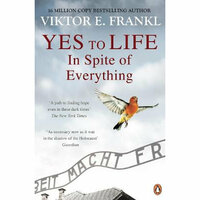You need to sign in or sign up before continuing.
Take a photo of a barcode or cover
inspiring
slow-paced
Beautiful, amazing - definitely some big language that I needed a dictionary for but I get it.
Perhaps it was just my (darkish) mood, perhaps i read too quickly, skipping over important parts, but Yes to Life didn't give me what I needed at the moment. While I can admire Frankl's story, I am not sure that I agree that suffering adds meaning to life. I'm not even sure that every life has meaning, though I hope that it does. The examples cited including Frankl's own experiences, are, to me, exceptional, not the norm.
"Propaganda,...relies on not just lies and misinformation but alos on distorted negative stereotypes, inflammatory terms, and other such tricks to manipulate people's opinions and beliefs in the service of some ideological agenda."
(5) [from Introduction by Daniel Goleman 2020)
"We give life meaning not only through our actions but also through loving and, finally, through suffering. Because how human beings deal with the limitation of their possibilities regarding how it affects their actions and their ability to love, how they behave under these restrictions - in all of this they still remain capable of fulfilling human values." (39) [I need to ponder this one more...]
"So we can see that illness does not necessarily involve a loss of meaning, an impoverishment in meaning of our existence; but depending on the possibilities, it is always something meaningful." (62)
"Propaganda,...relies on not just lies and misinformation but alos on distorted negative stereotypes, inflammatory terms, and other such tricks to manipulate people's opinions and beliefs in the service of some ideological agenda."
(5) [from Introduction by Daniel Goleman 2020)
"We give life meaning not only through our actions but also through loving and, finally, through suffering. Because how human beings deal with the limitation of their possibilities regarding how it affects their actions and their ability to love, how they behave under these restrictions - in all of this they still remain capable of fulfilling human values." (39) [I need to ponder this one more...]
"So we can see that illness does not necessarily involve a loss of meaning, an impoverishment in meaning of our existence; but depending on the possibilities, it is always something meaningful." (62)
challenging
emotional
hopeful
informative
inspiring
reflective
sad
medium-paced
A shorter, more abbreviated version of "Man's Search for Meaning." I should have read this one first since it serves as a good introduction and does not quite go into so much depth regarding Frankl's experience in the concentration camps. I still don't wholly agree with his medical ethics but I think his personal philosophy is robustly thought out. Worth reading for anyone interested in postmodern philosophy.
informative
reflective
fast-paced
Anyone who has read something by Frankl will know that anything else he’s written will be fantastic. I read ‘Man’s Search For Meaning’ many years ago, and don’t know why it’s taken me this long to meet with Frankl again. Perhaps it is because reading ’Yes To Life’ in mid-2024 turned out to feel fateful, vital - providing great hope and heart, but equally great foreboding and despair.
We want to think we have come so far, and in many ways we certainly have… but in so many we haven’t, and in an increasing, worrying number, we are regressing. Seeing the current state of the UK, and I daresay much of the world, described plainly by a compassionate and erudite man talking about Europe in 1946, is beyond jarring. It feels like someone stepping on all of our graves.
Amongst the most haunting parts for me were Frankl’s accounts of how both Nazis and the general public viewed the lives of disabled people, in which he uses the term ‘fit for work’. He is describing the UK disability benefits system. I do not exaggerate.
Somehow what has always seemed the utter nadir of humanity now disturbs impossibly further. ‘Never again’, ‘lest we forget’… we have no clue. We’re still living in it. But because it can never happen again, it can’t be happening right? You can’t remember or forget what you refuse to acknowledge.
‘Yes To Life’ is, genuinely, not a downer. Frankl was an exceptional human being - whether or not he believed it himself! - and one of his many gifts is the ability to always inspire hope, for oneself and the collective, for now and the future. Against the odds, then and now, he achieves this.
We want to think we have come so far, and in many ways we certainly have… but in so many we haven’t, and in an increasing, worrying number, we are regressing. Seeing the current state of the UK, and I daresay much of the world, described plainly by a compassionate and erudite man talking about Europe in 1946, is beyond jarring. It feels like someone stepping on all of our graves.
Amongst the most haunting parts for me were Frankl’s accounts of how both Nazis and the general public viewed the lives of disabled people, in which he uses the term ‘fit for work’. He is describing the UK disability benefits system. I do not exaggerate.
Somehow what has always seemed the utter nadir of humanity now disturbs impossibly further. ‘Never again’, ‘lest we forget’… we have no clue. We’re still living in it. But because it can never happen again, it can’t be happening right? You can’t remember or forget what you refuse to acknowledge.
‘Yes To Life’ is, genuinely, not a downer. Frankl was an exceptional human being - whether or not he believed it himself! - and one of his many gifts is the ability to always inspire hope, for oneself and the collective, for now and the future. Against the odds, then and now, he achieves this.
Frankl's perspective, shaped by his experiences in concentration camps, transcends traditional autobiography, offering a psychological analysis of human nature and resilience. His ability to view such harrowing events through a psychological lens is awe-inspiring. The book not only serves as a testament to the strength of the human spirit but also invites readers to reflect on their own purpose in life. As Nietzsche once said, "He who has a why to live can bear almost any how," a sentiment that resonates deeply with Frankl's narrative.
adventurous
challenging
emotional
hopeful
reflective
sad
medium-paced




